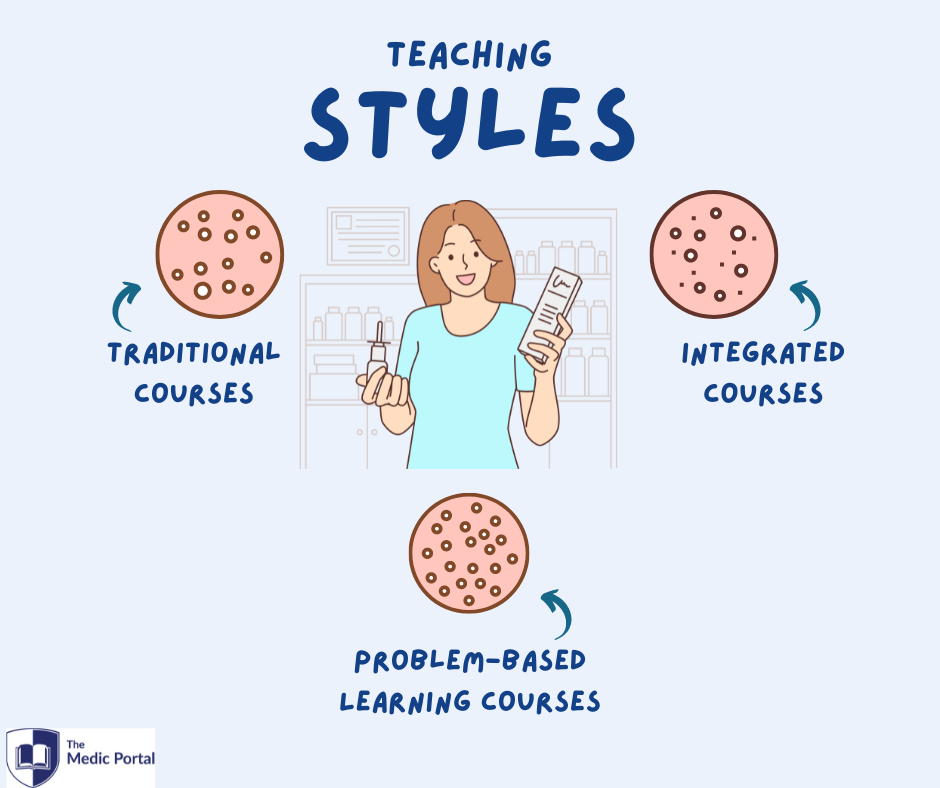What Are The Different Dentistry Course Types?

Dental Schools use different teaching styles, which might impact where you want to study. The different styles are:
Structure: Traditional courses, often referred to as conventional medical programs, are characterized by a clear division between pre-clinical and clinical stages. The first few years focus heavily on theoretical knowledge through lectures and lab sessions, covering basic sciences such as anatomy, physiology, and biochemistry. Clinical training, involving patient interaction and practical experience, occurs in the later years.
Teaching Method: The teaching is mostly didactic, with a significant emphasis on rote learning and memorization of facts during the pre-clinical years.
Assessment: Students are typically assessed through written exams and practical tests that evaluate their knowledge of the sciences fundamental to medicine.
Structure: Integrated courses aim to blend theoretical knowledge with clinical experience from the early stages of the program. This approach seeks to contextualize medical sciences within a clinical setting from the outset, thereby enhancing the relevance of theoretical learning.
Teaching Method: These courses use a combination of lectures, small group sessions, and regular clinical placements to integrate learning. The idea is to link scientific and clinical disciplines more cohesively throughout the course.
Assessment: Assessment methods in integrated courses often include a mix of continuous assessment, practical exams, and written tests, reflecting the diverse learning settings.
Structure: PBL courses are structured around case studies used as a starting point for learning. Each case or problem is designed to highlight particular learning objectives. Students typically work in small groups to explore and resolve these cases, guided by a tutor.
Teaching Method: The focus is on student-centered learning, with the role of the tutor being to facilitate rather than to instruct directly. This method encourages critical thinking, problem-solving, and self-directed learning, as students must identify their own learning needs and seek out the necessary resources.
Assessment: Assessment in PBL courses can include reflective essays, group participation, oral presentations, and traditional exams. The variety reflects the broad skill set that PBL aims to develop.
Take some time to research how these teaching styles vary and what each Dental School uses. Then decide which style might suit you best, based on how you learn most effectively.
Can I Do A Foundation Year?
Certain Dental Schools offer courses with a foundation year, which are suitable for students who performed well at A-Level but didn’t study the required science subjects. Some Dental Schools also offer courses with a foundation year for students who meet certain ‘widening participation’ criteria. You can see the full list here.
With a foundation year, the course lasts six years (compared to five years for a typical undergraduate Dentistry course). They include a preliminary year in which you’ll learn pre-clinical information and cover the foundation levels of science required to study Dentistry.
UK Dental Schools: How Important Is The UCAT?
What Are Intercalated Dentistry Degrees?
An intercalated degree means that you will get a BSc (or equivalent) from taking a year out of Dentistry to study another subject. This usually occurs between second and third year.
The possibility of completing an intercalated degree depends on the university, so if you want to go down this route, you should do your research prior to applying.
Here are some UK universities that offer intercalated dentistry degrees:
- King’s College London – Offers a range of intercalated BSc options including in subjects like Anatomy, Developmental & Human Biology, and Neuroscience. They provide a robust platform for dental students to explore scientific research and advanced dental sciences.
- University of Bristol – Dental students at Bristol can apply to intercalate in a number of biomedical subjects at either the BSc or MSc level, depending on their interests and career aspirations.
- University of Leeds – Leeds offers intercalated degrees in several areas such as International Health and Clinical Sciences. Their programs are designed to develop additional research skills and specialized knowledge.
- Queen’s University Belfast – Offers options for intercalation in Medical Science or other related fields, allowing dental students to gain additional qualifications and experience in specific areas of interest.
- University of Glasgow – Provides opportunities for dental students to intercalate in subjects like Anatomy, Physiology, and Sports Science, broadening their academic and research experience.
These intercalated degrees typically involve a significant research project or dissertation, alongside taught components. Students interested in these programs should plan early and consult with their academic advisors to understand the specific requirements and benefits of intercalating in their chosen field.
